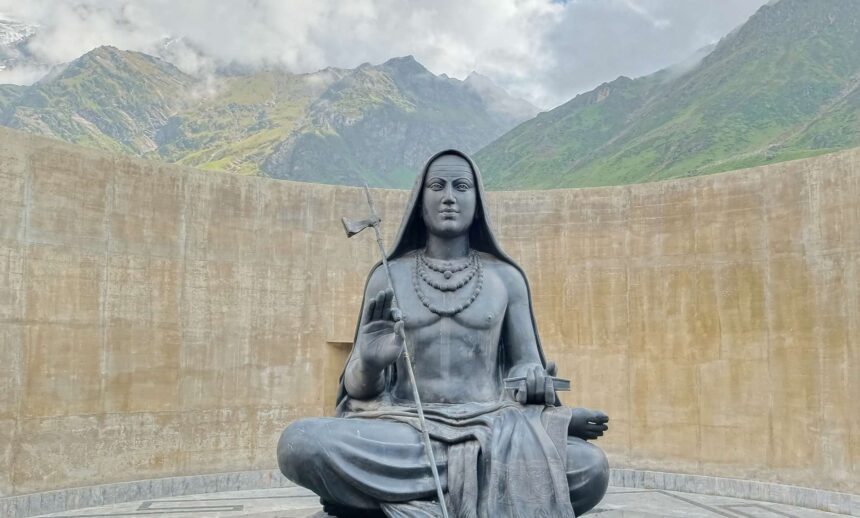The recent inauguration of the Ram Mandir in Ayodhya has spotlighted the range of perspectives among Hinduism’s most eminent spiritual leaders, like what the Shankaracharya on Ram Mandir has to say. As guardians of Hindu theological traditions, the views of these learned seers carry immense weight for devotees worldwide.
In this guide, we’ll analyze the key viewpoints and concerns expressed by various Shankaracharyas regarding the new temple, what they reflect about contemporary Hinduism, and how these esteemed figures may shape the site’s future role.
Shankaracharya on Ram Mandir
Overview of the Shankaracharyas
The honorific “Shankaracharya” refers to the abbots of Hindu monasteries, or mathas, established by Adi Shankara in the 8th century CE to promote Advaita Vedanta philosophy. Today there are several Shankaracharya lineages across India, with pontiffs providing spiritual guidance to millions of Hindus.
While united on core theological principles, the different Shankaracharya traditions have their own interpretations and practices. When rendering judgments on religious matters, they emphasize scriptural adherence and preservation of rituals.
Support for the Ram Mandir
Some prominent Shankaracharyas have enthusiastically endorsed the new Ram Mandir:
- Swami Swaroopanand Saraswati of Dwaraka Peeth hailed the temple as symbolizing India’s cultural reawakening.
- Swami Avdheshanand Giri of Juna Akhara, which was closely involved in the temple’s construction, attended the inauguration and called it a milestone for Hindu society.
- Swami Sacinand Saraswati of Kanchi Kamakoti Peeth also voiced support and fulfillment of Hindu aspirations.
Their statements emphasize the temple’s role in nurturing Hindu pride and unity. By affirming such sentiments, these Shankaracharyas boost the mandir’s legitimacy for followers.
Read This Too: Ram Mandir Murti: अयोध्या में प्राण प्रतिष्ठा
Concerns Over Ritual Purity
However, some Shankaracharyas have critiqued potential deviations from traditional temple consecration rituals:
- Swami Avimukteshwaranand Saraswati questioned whether prescribed rituals were shortcut under political pressure and could render the mandir impure.
- Swami Nischalanand Saraswati declined to attend the inauguration, citing an incomplete sanctum and purification rites.
These dissenting perspectives uphold the Shankaracharyas’ role as guardians of Hindu ritual purity. Their cautionary voices urge reflection on resisting political expedience.
Underlying Political Dimensions
As Hinduism’s highest theological authorities, the Shankaracharyas feel bound to uphold apolitical ideals. However, the Ram Mandir’s contentious history makes it difficult to separate from politics.
- Some seers may avoid involvement to prevent perceptions of partisanship.
- Politicians have also sought to capitalize on the temple for electoral gains, further muddying sentiments.
- While unified on Lord Ram’s sanctity, the Shankaracharyas differ on the temple’s ideal role in society.
These complex dynamics underlie the nuances in their stances.
Scriptural Interpretations
The Ram Mandir also surfaces theological differences between Shankaracharya traditions:
- Their views on whether the precise Ayodhya site is directly specified in scriptures versus being a matter of faith affects reception of the temple.
- Determining the mandir’s precise consecration needs based on ancient texts creates objections by some lineages.
By elucidating these scriptural debates, the seers fulfill their role as learned Hindu theologians.
Looking Ahead
The spectrum of Shankaracharya viewpoints on Ayodhya carries important implications for Hinduism:
- It reemphasizes the need for scriptural adherence despite emotional satisfaction over the temple.
- Their guidance can steer the Ram Mandir toward an inclusive spiritual symbol rather than political lightning rod.
- Encouraging deeper theological reflection beyond just celebrated outcomes advances Hindu philosophy.
While differences remain, the Shankaracharyas’ collective wisdom promises to shape the mandir’s enduring contributions to Hindu cultural and spiritual life.
Key Takeaways
- The Shankaracharyas offer varied perspectives on the Ram Mandir based on ritual purity, scriptural interpretations, and political affiliations.
- Some enthusiastically endorse the temple as fulfilling Hindu aspirations, while others raise concerns over shortcuts.
- Their viewpoints highlight needs to uphold spiritual traditions and prevent political expedience.
- The mandir offers opportunities to nurture philosophical insights but requires avoiding partisan overtones.
Frequently Asked Questions
Q: Why don’t all Shankaracharyas share the same perspective on Ayodhya?
A: The different Shankaracharya lineages have their own practices and interpretations of scriptures, leading to divergent views on ritual needs and political affiliations. But they agree on Lord Ram’s significance.
Q: Which Shankaracharyas openly supported the Ram Mandir?
A: Swami Swaroopanand Saraswati, Swami Avdheshanand Giri and Swami Sacinand Saraswati have endorsed the mandir as fulfilling key Hindu aspirations.
Q: What concerns did Shankaracharyas raise about the new temple?
A: Some like Swami Avimukteshwaranand Saraswati raised issues over proper rituals being shortcut, while Swami Nischalanand Saraswati objected to the incomplete sanctum.
Q: How might politics influence the Shankaracharyas’ perspectives?
A: The mandir’s contentious history makes it difficult to fully separate from politics. Some seers may avoid involvement to prevent perceptions of partisanship.
Q: What role can the Shankaracharyas play moving forward?
A: Their wisdom can guide the Ram Mandir toward being an inclusive spiritual symbol that deepens theological understanding beyond just celebrating the outcome.
Q: Why are the Shankaracharyas’ views on Ayodhya important for Hindus?
A: As learned guardians of rituals and theology, their perspectives carry immense influence over how Hindus interpret and relate to this culturally resonant issue.
Q: How do scriptural interpretations affect the stances taken?
A: Differing views on whether texts precisely specify the temple site, and on ritual needs, lead to debates over consecration protocols.
Q: What are the future implications of the varied opinions?
A: It underscores the need for reflecting on scriptural adherence, avoiding political pressure, and crafting an inclusive spiritual symbol for Hindu society.








